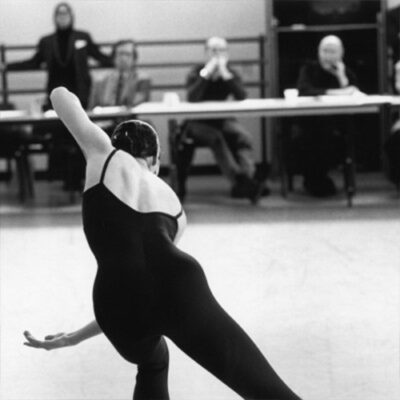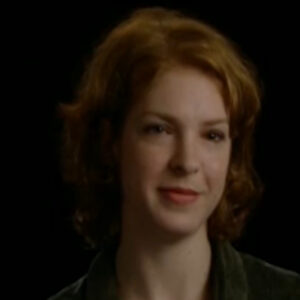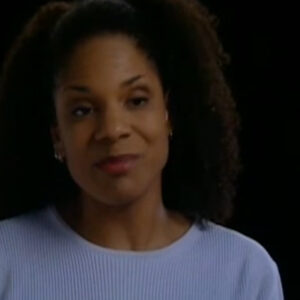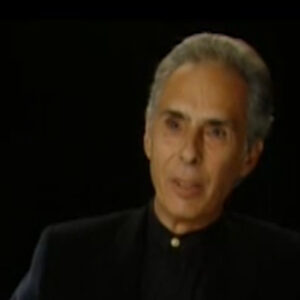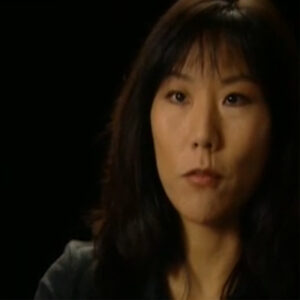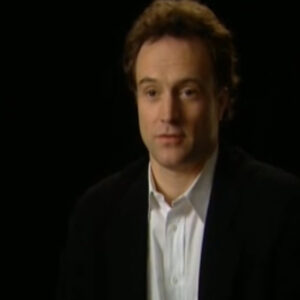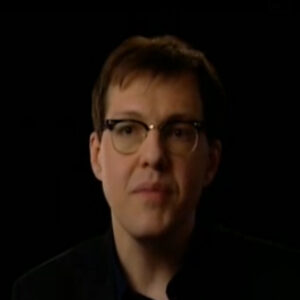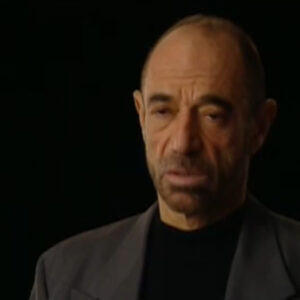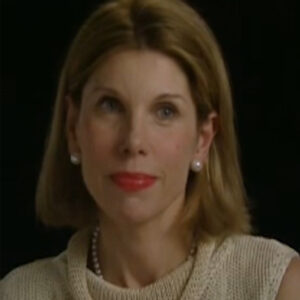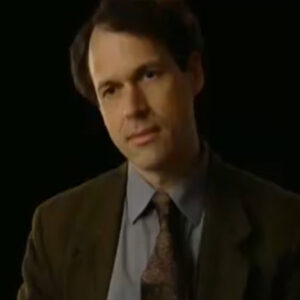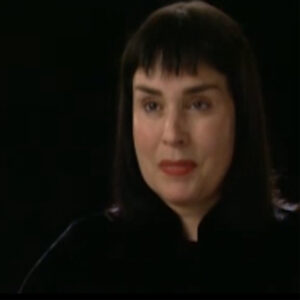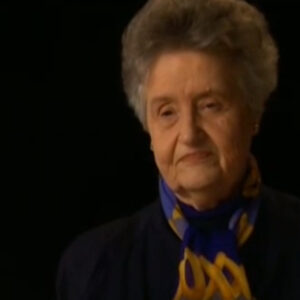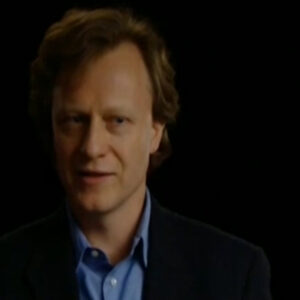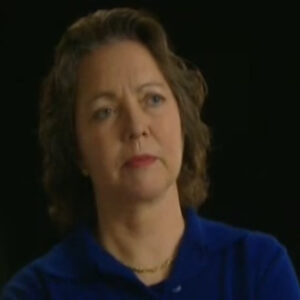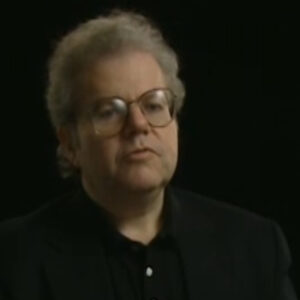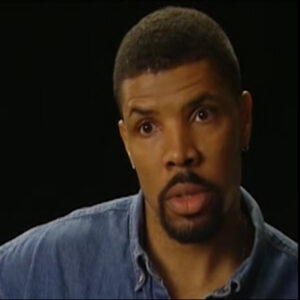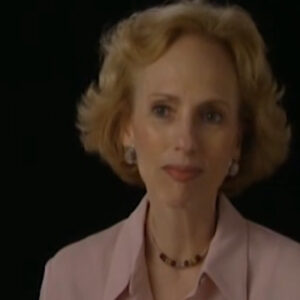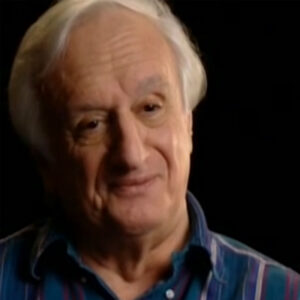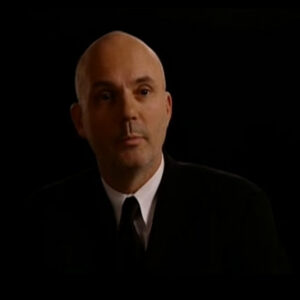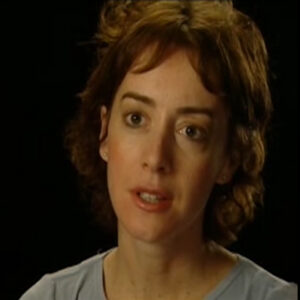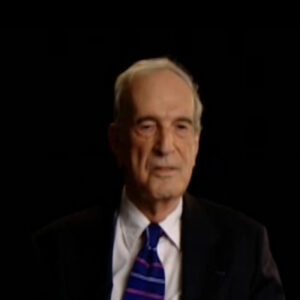Speaker Where did the sort of seeds begin where you thought, I’m really not quite sure I and I, I can remember in nursery school, you know, like the little pageants and things like that, not not beauty pageants, but, you know, the little school plays and little like, you know, Halloween pageant thinking and dressing up and things like that. Actually, I was born here in California and my everyone told my mother I was this gorgeous little baby. And so she tried to get me into commercials. And just as I think I landed one, we moved. And she wasn’t by any means, you know, backstage, mother, anything, which is sort of a fluke kind of thing you do. I don’t know if that influenced me or not. My grandmother lived with us and she my parents worked and my sister was at school, so I would be at home. So she would tie a stocking leg to the bottom of a rocking chair and the other around my ankles. So I just have this amount of room to go because she was watching the stories, the soap operas.
Speaker So I think because I’m like I’m an original all my children’s soap opera watcher, I mean, because I’ve been watching it since I was born.
Speaker So I think that relationship and I guess but I don’t I can’t tangibly say this is where it came from or that I one day woke up and thought I was more attracted to it than it was to sports. I was more attracted to it than I was to my homework. So just I don’t know how or why.
Speaker I know in fourth grade it’s an all white school except for me. I did the Flip Wilson Show. I was flip and I don’t know how that happened. I had the red jacket, the whole thing, and I did the Wilson Show. And then I somehow I don’t know, I just auditioned for the school plays and it just sort of happened.
Speaker I don’t know how and where Juilliard come into your notion. At some point in high school, you started thinking, I hadn’t even I didn’t even know what Juilliard was.
Speaker I don’t like when I tell people I’m from, oh, you play an instrument, what instrument do you play? There’s not an association necessarily to the acting program there. I had gone to NYU undergrad drama and I knew in my senior year that I was really serious about being an actress, but I knew the kind of training that I had acquired at NYU as well as being a woman of color. There was no way I could just begin, at least for me. I felt that way and also really being interested in European classics. And I had at the time, they were league schools, all these professional schools, they belong to a league.
Speaker And I arbitrarily I’m not even quite sure how close schools from all around the country and and by that time knew of Juilliard, but it was just like Northwick.
Speaker How was it? I mean, how was going to Juilliard? Please, there’s just no way. And for some reason I thought I could get into Yale because of Lloyd Richards. And I just thought he was the, you know, the be all and end all I could get in that program. And where I was taking class at the time, uh, one of the teachers said to me, well, if you can and can’t get into Juilliard, NYU, Yale, you know, you’re up Schitt’s Creek, you know, you should really try to get into the top three. So I just arbitrarily took that advice and I didn’t apply to any of the other schools and I applied to Juilliard at NYU.
Speaker And my first choice was Yale. My second choice was NYU. And Juilliard was my third choice because I just never thought I could get in. It just didn’t seem possible for some reason. And Juilliard was my first audition. And in fact, my sister and I were living together at the time and my Juilliard application was late because I did I mean, and she saw it sitting on my desk and I was two weeks late and she picked up a purple pen, handed it to him. He said, fill this out and walk it tomorrow if I’m going to kick your ass. If you don’t. And I called up and I said, my application is two weeks. We can I can I still out? It was Barbara’s last name. She was the secretary there at the time. She said, well, come on in, I’ll walk it through with you. And sure enough, I went there and she even though it was two weeks late and my sister drove me to the audition and I didn’t think because I knew I couldn’t get in it to me was a practice. It was a, you know, my getting used to this audition process. And Andre Brower was my room monitor and he was the one that took me to all the different places I had to go.
Speaker And I remember being really impressed that, OK, well, you know, OK. But I still didn’t think that I could get in.
Speaker And Michael Kahn, if he still does it, to the extent that he ran the they do a group improv kind of thing and, you know, pretend you’re Jello and whatever. And I actually have acquired that same philosophy about audition’s I’m not particularly social, I don’t like looking and talking to people. I pretty much try to find a corner, and I did with that process and. But because I didn’t think I could get in, I just tried to focus on how I was feeling about the experience and yuck, yuck, yuck, and did my audition and didn’t feel one way or the other about it. Persay. And so usually they still do it. They put a sign up and if your name is on the sign, you have a callback. If your name is not on the list, then thank you for coming. We love you, but never mind. So I came back and my name was on the list and I was floored. Could not believe it. And I remember I called a friend from NYU and he helped me on my audition some more and I came back and so I pretty much left it, though I thought it was exciting and I got a callback. But the likelihood of me getting in out of a thousand students was so slim. I thought. And I auditioned for a Yale and my audition was off well.
Speaker And right after I left, I was weeping because I knew I blew it.
Speaker I knew I blew it. And then I auditioned for NYU.
Speaker And Zelda put me through some extraordinary test where I came back three times. So finally I was put on a waiting list. And then I found out that I got accepted to Juilliard, which just. I didn’t know how that happened, and so I thought I had a choice actually between NYU and Juilliard and NYU seemed more logical because it was a graduate program so I could actually get graduate funding versus NYU, Juilliard. It’s not considered a graduate program. The drama department isn’t. So from a financial standpoint, Juilliard didn’t seem practical to me. And I called Michael Cohen actually, and introduced myself and to see if he remembered he did. And I said, you know, I don’t know which school to go to.
Speaker And he says, well, you just you want me to Juilliard and that the rest is history. That was it.
Speaker Do you remember what pieces you did for your audition? What was what what were you working on? What were you trying to show them?
Speaker Or what did you talk to them about? What they think people want to see you work on it and think about it.
Speaker Oh, as a black woman, I don’t think people know what they want to see. So like Chris Rock, Chris Rock says of, you know, Colin Powell, you know, white folks.
Speaker Oh, he’s so articulate. Well, he’s supposed to be articulate, very well educated person.
Speaker So I always figure I can do what I want because no one really. But I mean, I don’t think that they know what they want from me. So I felt to do pieces that were easy for me and reflective of me that I could relate to. It didn’t make sense to to do an audition piece of some old old woman, you know, was obviously picking someone close in age and someone who was close to me. So I did benefit from Raisin in the Sun and I did Phoebe from as you like it, which were which still are. I feel very light, like it’s the beneath the pieces and particularly light, but I’m accessible for me. So it wasn’t so much. And you actually had to choose a classical and contemporary piece of. I believe that’s true. So there was that qualification as well. So.
Speaker And.
Speaker Tell me a little bit about the classical training you were saying, really, you want to go on to work in the classics when you when you first got to school?
Speaker What did you talk about?
Speaker Getting there and getting that classical training and what you thought it was going to be and what it.
Speaker I had no idea.
Speaker Um, certainly I had experienced, uh, acting class and speech class and a little bit of movement class in my undergraduate program. So, um.
Speaker The nature of that wasn’t necessarily foreign to me, but here was this big time school, Juilliard, and with a reputation, so I didn’t know what to expect. I do remember our our first year we had to do our audition pieces in front of the rest of the class. And that’s when I knew I was in trouble because everybody was phenomenal. And I was like I was in such big trouble. And in particular, one of our dear, dear classmates, I’m from Group 18, Erika Knutson, who passed a number of years ago.
Speaker He was beyond brilliant.
Speaker And I just remember thinking, oh, my God, if I could just I first I didn’t know why he was in school.
Speaker It just made no sense. I couldn’t figure out why Eric was in school. And I always remember that.
Speaker And in fact, I was never in Eric’s group because we were divided up into groups. And I always felt Eric was so much better than me. And I got in every production. I always thought if I could just be like Eric and transform like Eric because he just he just handled text so well and just seems so smart. So I knew I had to work extra hard and be extra ready and.
Speaker I just remember working really hard and being really, really focused for the first, I think like two and a half years and then you get the fourth year blues, like, come on, I got to get up here.
Speaker And what was the relationship like? Know, they create the groups. They create the situation where you you’re virtually, as I sort of sort of see it kind of like buck naked in front of these people.
Speaker Yeah.
Speaker For the first I think first year, we were probably a family, I would say, in terms of, you know, you’re just so lovey dovey and you love each other and you’re very, very close. For me, there were only two black students in the class, myself and another guy named Dwight Donaldson, who they end up cutting. And I felt Mike’s experience was so different from the rest of my classmates.
Speaker I would venture to say that still, I don’t know them that well.
Speaker I didn’t fit, I mean, I just didn’t fit and there was no one to to turn to in terms of the faculty, there were no black faculty, there were no black directors. And you are at least when I went to school, you were so segregated in terms of divisions that you never really had the opportunity to be on the dance department or the music department because you spent so much time in your own department. I think I did get to know some of the dancers, a little bit of color, but I also commuted. I lived in Queens. I live way, way far out in Queens. And so I had a very long commute. So I couldn’t really hang out after class because we got done with class at 10:00. So by the time I got home, it was like eleven, eleven thirty. And then I have to get back on the train and come back. So that was an issue of not really having to be able to spend time with the class.
Speaker And I think like all college and school experiences, you the CLECs form, you know, and and I wasn’t with a click per say. So I love seeing my classmates now and wondering how they’re doing and things like that. But I, I didn’t form a close bond with any one person in particular.
Speaker And you were saying before that you felt like you didn’t fit in. It’s funny because it’s exactly the same way that Steven talked about what it wasn’t like. You didn’t understand.
Speaker He just felt like he didn’t belong there. And he spent a long time feeling like, I understand this place. I’m not confused about what this is, but I just don’t belong here.
Speaker And he kept saying he kept trying to figure out when they were going to figure out what to do, but they kept treating him. I mean, what.
Speaker John Stick’s was my advocate. He reached out to me more than any other faculty members.
Speaker At one point he said to me, either you’re going to, you know, get off the pot, you know, and there really was a conversation whether or not I should stay, because I don’t I I think because I was didn’t feel like I fit that I held back a lot more and wasn’t as open and vulnerable and a risk taker, which is what ideally you should be doing in that educational environment, is taking risks to learn to make mistakes. And I do remember a conversation with John and actually with Stone, which was, you know, do you. And actually, it came it came from John Sticks, which was, you know, am I going to join the circle more? I don’t think I ever really joined the circle necessarily.
Speaker But I understood from a personal standpoint that I had to find my way within myself to it wasn’t my job to fit in, you know, but to fit in with myself and to find what what does this instrument do and and what what does this brain want to do and what am I interested in?
Speaker It just wasn’t conducive to diversity. It wasn’t sensitive to my difference that I that I have. I remember they used to do critiques. They still do that. I know John Williams said to me, you sound too ethnic to work on that as a mother.
Speaker But but I understood what he meant.
Speaker But it took a while because the sensitivity of that was ridiculous, because he he should have come at me at a different route. You know, I had to interpret what that idiotic comment meant. I completely understood what he meant, which was you need to find that neutral zone so that any dialect you want to play is easy because you have the skill and you have a blank slate in which to draw from.
Speaker I could have accepted that explanation, but you sound too ethnic. I mean, you know, what do you say to that? I mean, I am ethnic. I don’t know, you know, but I understood what he meant.
Speaker So I think it was that kind of having to interpret what they really meant kind of stuff. And just, you know, there was no one like me there. So John really, I think, went out of his way to check on me. And his door was always open to me and. He really took care of me.
Speaker I hope I haven’t had to experience that sort of feeling and feeling at NYU. I mean, what did you find to be different from being underground at NYU downtown and then sort of going up to what I now call the ivory tower, which we are really, really very different? Or is that kind of feeling, a feeling that comes from all these kind of, you know?
Speaker Well, I was very similar to to Juilliard. I was also political at NYU. But because NYU is not a conservatory, the undergraduate program, and it is more of a liberal arts program, you spend actually more time or a considerable amount of time outside of the theater environment, in the academic environment. So it was easier to acquire and find folks who are similar to me in terms of my thinking and my background and the the same amount of protesting that I did at NYU.
Speaker I spent the same amount of time in, you know, Harold Stone’s office or, well, not Michael Ingham’s office, but complaining about certain aspects of the program and how it didn’t tend to the needs of. So I think it’s just the nature of America.
Speaker I don’t think that it’s I do the same conversation with David Kelly. I mean, so it hasn’t changed at all.
Speaker So I often don’t fit in general. I don’t feel like I fit.
Speaker And how was how was it how was Harold I mean, you know, it’s like there’s Harold Coarsen sort of remaining in this. I’m still there. I feel in some ways it’s very unchanging. I mean, it’s the same faculty. I mean, Michael Cullen was it you know, we can rise with John Houseman and now he’s still teaching, you know, kind of the sense of of them changing with the times, changing with the people, you know.
Speaker But I think that Michael Kahn comes from a different sensibility than Michael Langham did.
Speaker I think it’s an issue of of ethnicity.
Speaker The countries they’re from, you know, Michael being from, you know, the states and and Michael Langham being a Brit, a very old white Brit, I think a lot of that comes with the package of the way of thinking in the way of operating. Um, I think I’m just due to Michael Collins politics, he’s just more liberal in his desire for inclusion, is reflective of, from what I understand, the new school pop, you know, student body population in the drama program, that there actually are Asian students in the program, that they are actually black playwrights at the school. So I think it just someone’s politics. And Harold is interesting because he’s sort of I think is the dad, because you go to hell for everything.
Speaker You have money for food. You go to Harold if you’re having a problem and one of the classes or, you know, you have to be reprimanded or something.
Speaker And I would have the usual conversations with Harold about, you know, what I felt was lacking in the program for me and how it was lacking for everyone to have not to not experience a black director or Hispanic teacher or was disturbing to me, not only for myself, but for the entire student body.
Speaker And I remember talking to Harold about affirmative action and. What it was, it was perfect, it was the perfect misunderstanding of what affirmative action is. So one of the reasons why we didn’t have another black director, according to Harold, was that we had a black director before I got in there and he sucked. So, you know, we really can’t get any of your people back.
Speaker And so Harold did just, you know, affirmative action didn’t work as well. And, you know, what do you mean by that? So how so? Well, it’s just, you know, it’s not qualified people.
Speaker I said, well, Harold, you’ve missed the point of affirmative action.
Speaker You have a white girl who’s really great, you have an Indian girl who’s really great when you’re trying to diversify your program, you pick the Indian girl, you don’t pick the chick who sucks.
Speaker You miss the point. And so but to have that conversation with someone who’s running my school, what do you say?
Speaker You know, let me get out here after four years and we’ll call it a day. I mean, I you know what I had I don’t know how to fight that. How do you deal with that conversation? There’s no conversation to be had.
Speaker And then will I ever get to play a character that’s my own age?
Speaker Do I always have to play the black old women in every production? Will I ever have the opportunity to be the lead in a production? I never kissed at school. Never had a love scene ever.
Speaker How do you get to school and not how to experience that and what that is and what that means? And never.
Speaker There’s something to that inherently, but that gets to a point where how much of a teacher do I have to be?
Speaker I’m being a teacher to you and not tending to myself. Well, how much agita do I really need? At some point you pick your battles. I remember last year and Michael Langham was doing Lear, and I think we did June Moon, which is a summer musical. We did Dark Ride by Lynn Jenkins. I don’t know what the other thing was. So your fourth year, you know, last a year, you know, that’s that’s your big year. And I, without question, lobbied and politicked my way into Langham’s production, where I just only say that I lobbied because there was no way I was going to get in it has it Olbrich or put me in his play. So without question, I lobbied. And so I got you. Actually, Kelly Shoosh, I was reading, she was gonna say, well, I don’t know which.
Speaker That’s all they gave me the whole year, which meant there was nothing for me to do for like seven months literally.
Speaker A woman in my class, I’ll leave her name was starting every production, every production girlfriend starred in then man and it’s the truth. Every production she started and she wasn’t in Lear, but she was in all the other projects. And I went to Langham, as I tell you what do Lear and then I’m on leave for the rest. You come back for graduation because there’s no way you cannot give me a lead in a play.
Speaker Just doesn’t make sense. It’s not fair. It’s not logical. When’s my break. When is my break. And I said, I’ll tell you when you can give it. Take chick you know who stars and everything, pull her out and put me in her role. She’s not a sister to anyone. She doesn’t have to kiss anybody. It’s neutral to generic. In fact, you should have done it to begin with. So you all get freaky about, you know, relationships and all. How could you be in the same family? Give me give me a role that has nothing to do with anybody else. Bloodline. And I remember he said, well, I can’t how could I possibly do that to her?
Speaker Tell you what I will do, leave and leave and come back, and sure enough, I want to make sure enough he removed her from that project and put me in the lead of that. At the end of every graduating year, they give out a scholarship.
Speaker Who’s going to get the scholarship? The black kid. So all the other years. Mike Bech got it. And then the next year Andre Braugher got it and the next year, David Rainey got it.
Speaker Hello, it’s me. And nobody left. I worked hard. And, you know, I was part of Martin Luther King Day.
Speaker And I just know and I always remember this, I’m sure other people thought that they were going to get it, too. And I’m a full scholarship. Can’t I mean, I was on a full scholarship the whole bit. But remember when Michael Lingham and I remember the speeches because I would go to the other graduation day, which is some amazing speeches that these guys would give. And and I’m literally like me, right.
Speaker I’m here to do this. And she mentions the girl’s name and he says, for the trooper of the class, Griffin was not on scholarship.
Speaker I think she gave money to school and well, the trooper of the class and which is which was perfect.
Speaker It was lovely. It was just lovely. I said, well, all right, now let me be true to yourself.
Speaker Did you find that in all of this struggle, you saying you choose your battles?
Speaker Did you did you start choosing early on from those kinds of conversations with John Stewart? So this is what I need to accomplish. I mean, if I’ve got my four years here, this is what I need to do for myself. And what were those? What were those sort of what did you want to get out of the school as an actress for yourself? Or did you just feel, as I think many of the students out there now, I mean, my my third year actors were going into the last spring show has never had to leave. He’s enraged. He’s like just about ready to go. He’s like, I’m going to give it to Shakespeare this spring. Shakespeare. I don’t get this. I’m out of here because I just it’s not even just about casting possibilities, about competition. It’s about I don’t know how to carry a show or can I and I should go like for four years of, you know, my parents helping me pay and having a scholarship. And I think I ought to graduate high school with four years of, you know, with a hundred grand saying at least I know how to be late in a show.
Speaker Politics is everywhere. It doesn’t matter. And it’s unfortunate that it exists in education as well. I’m sure they won’t admit this. I’m sure they won’t admit this. But I truly believe they chose who they thought were going to be successful within the given class that they had the folks that they thought were really, really bad at the time. And I went to school. They they cut at the end of the second year. So the students who they thought, whatever the generic reasons are the school, you know, maybe I can just do it for them or maybe they decide to leave or maybe Julie doesn’t believe they can reach them. Whatever the reason is, there was that screening process. And I think with the costumes that are left, they, without question, choose who they think will be successful. And it is wonderful to say that Robin Williams graduated from, you know, I graduated but got kicked out from Juilliard, but that they we can, you know, put the name Juilliard and Robin Williams in the same category and how how ironic to be kicked out when he, you know, attained such fame.
Speaker But I really think they look at the class and see who who really is going to shine for us, who really is. And and maybe they don’t do that.
Speaker But if you do not leave the school, your class may be twenty and you don’t get to experience the full benefits of that kind of education. You got to call it something, whether it’s politics, whether it’s racism, whether it is.
Speaker How could you leave that very I mean, it’s so small, how could you not get everything out of it you wanted?
Speaker Bottom line is, I wouldn’t be here today if it weren’t for Juliar. I’d go back in a second. I go through the exact same experience that without question, primarily because I am a trained actor and I walk into a room knowing maybe not particularly confident, but knowing that I have the skills to do that role. And why do I have the skills? Because I went to Juilliard, because I had Liz Smith. Because I had Robert Williams, because I had drumsticks, because I had oh, how embarrassing he was that I have. All the other teachers.
Speaker I ever heard a Vagina Monologues, so that’s one of the actors that we’re following, just did Vagina Monologues for the leaks, which they advised her not to do, by the way, which is good for her.
Speaker I have acquired a relationship with with Eve Ensler. And she does these things called VDS, which are raisers. She does she does it in February. And it’s basically Vagina Day. And she she she takes a group of actresses to whichever spots she wants to do a fundraiser for organizations that help women who’ve been abused and things like that. So. So I was invited to do the V Day here in L.A. and it was a star studded cast, Winona Ryder and Laflin Boyle and Roseanne Barr and Christine Ali and me. And no one knew who I was, which is typical. Not any idea who I was this little black child doing in our room and was again, not fitting, just completely not fitting. And after the performance.
Speaker I felt so freakin good about who I was and about my training and about why I was in the business. It was one of those, you know, you’re doing OK, kid moments and not in terms of success or finance, but just in terms of how I’ve developed as an artist. And I, without question, comes from Juilliard, comes from Juilliard, without question. The insanity, the lack of professionalism, the drugs, the stuff was phenomenal.
Speaker And how ironic.
Speaker I think Vagina Monologues is one of the most important pieces in quite a long time for women in particular, and for there not to be a reverence paid to the piece, just that you’re there to do the piece and how important it is, but that also you are performing. I literally, literally was thanking Julie right that day because I said, you know, it’s OK.
Speaker I went I went the right route. You know, I went through the route of understanding urtext, the route of my body and my instrument and and knowing how to tune into things when they’re going wrong or how to rectify something or how to solve a problem in a text, knowing where to go, knowing who to call.
Speaker I mean, just basic stuff like that. I would I mean, I’m so grateful for Juilliard and all of the things that we’re talking about today. Purely it’s out of love because it’s about how to make a program better. Well, it’s it’s it’s still a very boys club institution. And I think it it what saves it is the faculty is the idea of excellence and the students that come in, because inevitably the conversations that I have had with Harold, you know, kids down the road have had the exact same conversation, but hopefully it’s been a little better, although I do not know all of the black alumni that came before me, without question, their presence helped me get there. And whatever their struggles were made it somewhat easier for me. I don’t know how it made, but it did. Their very presence made it easier for me. And I certainly see that as a part of my journey and my responsibility.
Speaker I am hopefully just making the door open a little, a little bit more, just a little bit more.
Speaker At least you try, you know, at least you try.
Speaker And actress, when you were at Juilliard, what was your what was the biggest thing that you were working toward?
Speaker What what is what?
Speaker What were you working on?
Speaker What was your you were sort of I mean, everybody comes in with that that charisma, that that sense of what got them into school. And then you see everyone around you. You think this is what I’ve got to work on.
Speaker This is what I’m still working on, all those things I’m.
Speaker That gives him a process, um.
Speaker I got very I thought everybody was smarter than me, I got very intimidated by Chekhov and. Because it seemed like everybody knew what to do already and how to do it, and the language just wasn’t mine, you know. So to this day with European classics in particular, is to find that rhythm that isn’t mine innately mine to find to find my way with with text that I still think is very universal, but still not my rhythm, not my music.
Speaker And that’s actually why I love I love a lot of things, but I love the European classics because it is foreign to me. So it’s challenging to me to to make it makes sense to to make it sound right to. To give what it deserves, but also to bring myself to it, that that always became the question in terms of. Casting and why I could never be the mother to this day, it’s the same thing, but at Juilliard, you know, why can I be the wife? Well, you know what? Why can’t I be? Well, you know, I mean, like John Simon says, you know, Black should just not do Shakespeare. You know, you weren’t there. Well, you know, there’s some you know, it’s just idiotic, you know, to come from. But but to get rid of that philosophy for people and say, yes, but if but it’s OK to cast me as the daughter because this is about suspension of belief anyway. It’s an artificial medium anyway. So how how and if it does jar an audience, great. We’ve done something. And then the magic is they will forget because it is about the mother and the daughter and the tragedy that happened. So I fought for that kind of stuff. But what I really, really remember most is trying to learn what they gave me to be the best because I wanted to do the European classics. Who the hell was going to hire me? So my philosophy even about going to going to graduate school was that I had to be the best. And I think in the Afro-American community, we raise our children that way. You have to be better than so.
Speaker So no one can say to you, well, the reason why you know the affirmative action.
Speaker No, because I am the best.
Speaker That’s why I’m here. I’m not here because you gave me a favor. I’m not here because a quota. I’m here because I’m qualified and I deserve to be here just as much as you do.
Speaker So I that was my big thing. And not that I was quote unquote better than anyone, but I just knew I had to be really good. Really, really good. And an example of that is at the league auditions. And I couldn’t get any of my classmates to work with me.
Speaker Had a hard time finding partners, a very hard time finding partners, and I took what I could get whoever was, you know, I had to wait.
Speaker So all people divide and found themselves and I was left.
Speaker And then the question became, well, you know, what do we do that the black girl? What when we got this? No, I’m going to do so.
Speaker Robbie Breckenridge and Nick Sadler were my my league partners and chose lovely pieces, chose lovely pieces and I thought did a lovely job.
Speaker I had prepared myself for the awful experience of not being of not getting an agent after graduating, because that’s the big thing you have your audition for and all the agents and, you know, the lists, all the names of all the agencies. And you your name will be on the list.
Speaker And my name was on one list. And like all my classmates, I’m so sorry, and there was not an ounce of sadness, of disappointment because I knew that this was my journey and I knew I had no problems with it, but I knew I was good. No, you can’t tell me that. You can’t tell me that. I have the skills. I have the credentials. You can’t tell me that. And I think that’s been my perseverance thingy. You can’t tell me I’m bad. I’m from Juilliard. I’m the bomb.
Speaker Come. I have great training. It’s just you can’t get around it.
Speaker And I studied it and I’m still studying it. I’m still trying to figure it out. And some stuff I still don’t understand. But boy, do I come qualified.
Speaker And, you know, all of my blond haired, very big busted, you know, female classmates who are being called by all the big guys, they’re not working, OK? I love them.
Speaker They’re not working because I just believed in it and knew and knew I have one little rinky dink agency call me. One and then another agency called me and I’ve been with them for 11 years, so your agent now is the agent.
Speaker They called you from the lake?
Speaker Yeah, I my name was on one list and I called them and met with them. And then two days later, this other woman called me and and she said, come in. And I called around to ask about the various aid and these two agencies who was better and what people thought and stuff. And I met with the woman who called me and she pretty much did like the soap opera stuff. So she passed me on to the theater guy who was the new kid on the block and who had seen my league audition and liked it. And it was really interesting to bring me in because and then I met another agent I think was just the interview process. And so I began freelancing with the first agency that had and this is literally just like within the first week or two. So the first agency that had written my name down and this agency brought me in. I remember this. Richard said to me, you know, you’re lovely and clearly you’re very talented. It’s it’s just we have nothing for black women, I’m looking at my desk right now and there’s just nothing to send you out on and we don’t freelance. I mean that we we sign people don’t we don’t we don’t freelance.
Speaker As a result, the experiment is free. This is what it is a little bit. Let’s see what happens if no work, no job, please.
Speaker And as I said to them, just let’s just try it. You know, let’s just try it, you know? And then a week, I mean, August Wilson’s piano lesson with Lloyd Richards. I mean, let’s just try it, shall we? Let’s just try the experiment. But I will always remember that conversation because that’s what I get.
Speaker You ain’t going to happen. You’re black. It ain’t going to happen. I got to Juilliard and I got accepted and it was time to go with the financial aid process. The head of the financial aid department had me come in and she didn’t. I don’t know if you knew I was back before I got there or not. So I was black eyes got real big.
Speaker So I don’t really think you want to go hear. Columbia has a very good program.
Speaker And I kept saying, you know, why you call me and talk about financial aid for. Why do you have a connection at Columbia?
Speaker Is there a reason? I don’t think you want to go here.
Speaker Columbia’s fair or so.
Speaker There’s always that you can’t do it. We don’t want you can’t you know, you can’t do it. And you just go, OK, OK, fine. Let me go around you. I mean, you know.
Speaker So once again, the trials and tribulations that I faced as a woman of color, Juilliard, were painful but necessary.
Speaker It prepared me, it prepared me for the hard time I was going to have in my profession. And I’m grateful for that adversity. I’m very thankful for it. Very thankful for it. I’m saddened by it. Frustrated by it. But I wouldn’t be where I am if it weren’t for the good and bad of Juilliard without. Without question.
Speaker What do you I mean, I’m just wondering, because you’re someone who who’s thought about a lot of these issues so much because JT and I were talking about earlier about the total lack of Asians in the drama division. And yet you’re in this environment of school. Flip side, the lobby, the music division, community college. Ninety eight percent of an Asian population in the sense of the school as a whole, because you had these music, you know, there are a lot of other, you know. People of color in school. Did you did you ever get that that sort of sense of support from the school as a whole, or did you just lose that knucklehead guy who’s written a book recently that black folks are made to play basketball?
Speaker It is it’s it’s it’s a philosophy that sticks just like Asians were made to be smart and made to play instruments. I mean, so if you feed into it and you support it, of course it looks that way. I mean, we’re Russians. I mean, are there genes such that they’re supposed to be really good chess players? How does that work in a science? It’s really interesting. I don’t know.
Speaker How does it work? It’s stupid. It’s called accessibility. It’s called what’s fit into you. So you know the school because it still remains the same way.
Speaker I mean, I know I think Pelusi actually reached out to me and, you know, had me in his office because I, you know, big mouth complainer and everything and and always said, you know, I want to try and bring me suggestions. And what what do you think would be good?
Speaker And I think he’s great for the school.
Speaker I mean, I you know, it’s different when you when you’re around someone who doesn’t want to hear, who doesn’t want to genuinely try and then be with the person who says, you know, just get out my face and I don’t talk to, you know, so well what’s wonderful about police is he tries, you know, he really, really tries. So, I mean, I didn’t go home and I think, oh, thank God for policing. He’s really trying. But, you know, I knew that there was this person who was running the school that does care and is trying to make an impact. But it’s hard, you know, because if you’re institutionalized one way, it’s very difficult to break out of that and and to find camaraderie among, you know, the team players when they didn’t grow up that way.
Speaker When you.
Speaker I say this is a funny thing that you said that I wanted to change down the line of people thought you were 30.
Speaker I’d love Cohen’s job, maybe 45, 50. You wanted to.
Speaker I want Conn’s job. I really do. I really do. I’m serious. I want this job.
Speaker Well, I could run the hell out of that program. I could run the hell out of it.
Speaker If that program or not, I think it I think his job is awesome. I mean, he I know one thing. He’s not leaving. Why would you leave that job? To be able to shape and mold and create artists who are who are here to educate the world and show us a society who we are and teach us. I can’t think of a better job than to be a facilitator of that and to watch kids find themselves and and to watch teachers find their way into a student’s brain, to get them to think differently, to get them to move differently.
Speaker Mommy’s class, I mean, what the hell is that stuff? I mean, what the hell is all of that stuff? But you do it and then you realize, oh, my body is changing. Look at the control. Look at this. I’m mean, I can’t think of a better gig.
Speaker And then to double the diversity that Michael has brought to the program to double to triple it.
Speaker I would just love to do that.
Speaker What did you I mean, I talked about specifically. Did you I think that you must have had people who I went to France and interviewed here, which is is he still having babies?
Speaker You know, he didn’t do any of it.
Speaker I was some 70 year old sperm, you know, with some strong sperm. But he twins. Twins, no less. What, they twins.
Speaker I think they’re not twins. I think you’re. Well, my God. Even better my genes.
Speaker OK, but you know that now, because from that moment on, in a very fashion, they all live in the same house together because there’s so much to love that grandfather and wife and her new husband and her children, her therapy sounds very complicated because he had brought to her income from, you know, such another world, you know, taught at age 90 about the white masks and the black masks, how he was because I asked him about it, but then he had thoughts about it. Um, we’ll talk about what the mask worked for you and what Peter was like in particular and what the struggles were.
Speaker I don’t remember if I had an issue with the white masks or as but even just in mask work in general, what?
Speaker Because I think it’s the same way that you just said that thing. I said you wanted a million people to say you go through like eight, but your body’s changing. I mean, talk about some of the other causes in particular, like mask and combat. And what are you you know, what’s the difference between speech and voice? Why is there why is there.
Speaker No, I don’t think she was there in your time when we had John West around the room with sticks and phrasing. I wish we had had that. I can say this because everybody knows he was an alcoholic and alcoholic music teacher who basically I never learned how to sing because he came drunk and we all knew that anyway. And literally all the people who could sing, who came knowing how to sing, sing, the rest of us sat in the back. I never learned thing.
Speaker Oh, so that was the way the glass mask class was great because it was about body, it was about expression of the inner so that it comes out. It was nothing about how you physically looked so you could pick a max that had no expression and bring expression to that and the fact that your face is covered in and all of that. I was really intrigued by the math class because it really was about the body, really about body, and that’s why I liked Molly’s class. I tend to be physical in order to find a relaxed place for myself and. So, so, so, Piers, class offered an alternative to. To struggle, you know, sort of a neutral place where all of that stuff could leave because it didn’t matter what color you were and the expression of that, although I do remember, though, we had I one of the.
Speaker You would, you know, pick a mask and then do something you have to get. Oh, they are doing this. And I actually did one where I picked being a slave on auction block.
Speaker And I remember nobody knew what the hell I was doing. So I was really bad at it.
Speaker But but I remember being very sensitive to that and working with me on that. And I remember that I was really cool. Uh, Judy Liebowitz, the Alexander teacher who passed. And you haven’t been able. She was. My breakthrough with Judy didn’t occur until, like my third or fourth year, and I’m embarrassed to say I can’t repeat younger kids, I’m sure they still do it the same way.
Speaker I can repeat that, your spine and your spine and your jaw on the backbone, everything sort of this little mantra she would say every time she said blank, I know what the hell she was talking about, made no sense to me whatsoever.
Speaker And I remember finally just one thing, but it wasn’t until my third year, which was cool, you know, everyone. And that’s that’s why you look at a look at school, like Yale or NYU, which is a three year program. And for a lot of us who had already gone to an undergraduate program, this was another four, four years of college.
Speaker And I don’t actually think the full four years is as good.
Speaker And the fourth year, I don’t know what they’re really doing now, but.
Speaker It’s something some teachers actually, and I would say, you know, if you get kicked out after the second year, you leave after the second year, you have the core of the training.
Speaker And I think the third and fourth years where you apply it and still are in a very safe place to to develop and grow and work on that. Um, I had to monarch, who was no longer there for, uh, diction and speech, and he was lovely, just just added to it. It was great. My ear, um, learning how to hear the differences between various letters and consonants and vowels and Mary and Mary and that there’s a difference between I couldn’t hear it, couldn’t he? I couldn’t hear. And it was almost like, oh, I don’t know what it’s like to be deaf, but to hear better, you know, I hear that now, you know, and knowing where to put your tongue. And I thought that that was fascinating to me and really good.
Speaker Um, uh. Jane, I was Jane’s last name.
Speaker She was a dance movement teacher because, yeah, and she was great. I really enjoy that because it wasn’t about ballet or anything. I mean, because I’m not a dancer by any means. So I felt.
Speaker Having no rhythm, either it was OK to explore and find my way and feel with her.
Speaker What did you think about the camera? We didn’t have it.
Speaker Wasn’t no. Well, you know what? It seemed to alternate, but we didn’t have it. Oh, that’s interesting. We have chance to know when Langham was there. It was. And it was all you know, every year the class did it, I think. But we didn’t do it. And we did. I don’t remember. I just. I know we didn’t do. Yeah, no, no, no. It’s like we did the third year traveling to the schools, which was one of my highlights because I just thought it was great.
Speaker So as an actress, if you look ahead to what you would have looked about wanting to go to Juilliard, where do you see yourself? How do you see your career trajectory moving and where do you want to be in twenty five years at the Barbara Walters question, what do you think of that?
Speaker Well, Barbara.
Speaker It’s a really great question because I find that L.A. and Hollywood poses a whole other set of obstacles that and perhaps because I’ve been here for four years, for years now, I sort of idealize what New York is like. But in New York, I felt so confident because I had. I had viewed the theater community to be somewhat liberal and progressive, that I, as a woman of color, actually had a chance of working and that I if I was good enough, I could get in despite a lot of stuff. And that carried me through tremendously.
Speaker And certain theaters really invested in me. The public theater just just totally gave me the opportunity to do the classics and invested in me and allowed me to. The highlight is that I was Isobella opposite Andre Braugher as the as Angelo and Kevin Kline as the Duke in measure for measure. And this was Shakespeare in the park.
Speaker Come on. I mean, what an opportunity and what an experience. And I know for a fact that the public theater at times really forces the issue of race with the directors. There are times when they do an awful job and then there are times when they have a director where they can really play with that. And I know without question that they truly supported me and forever grateful for that.
Speaker Holly was a whole other ballgame and it’s daunting, stupid, and it challenges me every day, you know, am I really, really doing what I want to do?
Speaker I remember the league auditions and we were all in the volumes looking it up and laying them, talking to doing the intro to our league auditions.
Speaker And he just completely dissed Hollywood, completely dissed commercialism and said we are about theater and regional theater and the classics.
Speaker And I believe that. And I took that on as as as my charge that I my goal was to attain a reputation of excellence in the New York theater community, the tri state area and possibly regional. That was literally my goal. And I found Hollywood wasn’t something I thought that I could even participate in. It just didn’t seem me. I just didn’t think it was something that I could do.
Speaker And it began to come into my life a little bit. And here Juilliard doesn’t matter. It’s irrelevant resumes. You don’t look at a resume. You look at your boobs, you look at your hair, look at your height, look at your ass.
Speaker I went on a general audition. This is just when I had my first intro to L.A. was like in like in 1990. So and I and I graduated in 89. So sit out on a general meeting with some exec at NBC and then he had my resume eager.
Speaker You know, this is what.
Speaker You don’t do comedy like tons of Shakespeare comedies that I like, but I’m not a comedy.
Speaker Do you think oh. So let’s sort of set the tone for my resume means zero zero.
Speaker Whereas one of the reasons why I wanted to go to NYU, Juilliard, NYU, because I knew that I had a little extra edge, especially as a woman of color, presumably should even be really good to get in. So the resume was important to me. And Juilliard being on the resume, you know, very important to me here. It’s not important. And I you’ve caught me at a great date. Ask that question because I’m at a loss.
Speaker It’s you can’t touch it here. You can’t feel it. It’s it’s weird. It’s it’s stuff that’s so far from who I am as an artist and what I want to be as an artist in this society.
Speaker And yet you got to be somebody to be in it and in it. You ain’t nobody.
Speaker And so here you it’s almost like you can’t even really have an argument or a conversation because you’re powerless, because you’re not anything. You’re not anybody.
Speaker And I’m having a really hard time here. And because I don’t I don’t fit, you know, so it’s sort of like, well, how do I how do I find a way to fit here with my sensibilities, which are totally the opposite of Hollywood. And I think. Artists of color in particular are discovering that no one is going to tell our stories the way we want our stories to be told, unless we write it, unless we produce it, unless we have full control of that.
Speaker So I’m discovering in particular as I age and certainly in the business for women as you age, the roles get fewer and fewer and fewer of into.
Speaker Kelly McGillis is a girl. When you turn 40, you don’t get any auditions. And so she and her husband are, you know, doing, you know, restaurants in Florida.
Speaker And so I’m beginning to think about that for myself. You know, what are the alternatives for me as I mature and as the roles decrease and perhaps it is writing, perhaps it is producing quest to do do I want to do it here? I have to do it here because it’s Hollywood is where movies are made. And so it’s this it’s a very weird, unhealthy existence that takes its toll just as much as it’s I think you sacrifice in New York.
Speaker There are some amazing women who I admire in New York, not Juliet alone, Persay, but Cherry Jones and Randy Dance and who. And I look at how they live, whether it’s still in a one bedroom, very small in the East Village and being 40 plus years old, you just go, wow, that’s deep.
Speaker I’m still 40 and live in a studio. I don’t know if I’m going to do that.
Speaker And so it’s also deciding what are my values, you know, materialistically what what do I want? And so it’s this weird balance.
Speaker I mean, you know, in the ideal world, I just would love to actually acquire the kind of reputation and a relationship I feel I have with the New York theater community in Hollywood. But that’s not attainable because it’s not you can’t there’s nobody to see it, nobody to talk to. Whereas I really felt you could talk to people, you could show your work and show who you were. And here you do. It’s not about any of that. So it’s interesting to have Michael Langham give this speech about, you know, go to hell with commercialism. And yet we also have to be equipped for that.
Speaker So I don’t think the Juilliard prepared me for this. And I’m not sure anybody can prepare you for this, although I did my share of calling it. People say, well, how do you how do you do it in L.A.? How do you you know, how do you find apartment hit your mark, say a line.
Speaker Let’s go Mortlock. I mean, this is Hollywood’s money time. Let’s move it along.
Speaker Let’s move a lot from some sort of fantasy, you know, level. I’ve got the best gig in town. It’s it’s, you know, one of the quote unquote hit shows on television and, you know, one awards and one of the great producers and writers on television right now, David Kelly.
Speaker And and in all sincerity, it’s a wonderful group of actors from all shapes and sizes and ages and who genuinely we laugh on the set every day is not I. I haven’t experienced a bad incident of unprofessionalism or anything like that. It’s we’ve got the best gig in town. We really, really do. It’s television and it doesn’t know what to do with black people either. The African-American male on our show continues to play the black angry man who’s violent.
Speaker And I’m you know, he’s every area. He’s pissed at somebody and he’s got a you know, he’s divorced single parent. This kid sells drugs. You know, nobody else experiences in the entire show. Nobody else but the black guy. I mean, you find out at 15 I had an abortion and you don’t know much else about me. You know, like gay. You don’t know if I like dogs. You don’t know if I have a mother you know nothing about. I’m a walking, talking head and I have my, you know, annual meeting with David, you know?
Speaker But what happens here is that you you you begin to adjust and compromise in ways you never really thought you would. And you say because. Well, because I’m getting older. Yeah. I have to have a house. I have to have a.
Speaker Well, do you really have to have any of this stuff really. Yes, I do. I do. But you begin to sort of accept things.
Speaker I have been fighting the decision to leave the show every minute of the day.
Speaker Every minute of the day, because for me, the only alternative is to go back to New York, which is not a bad alternative at all, but it does change my life. It does change it significantly. And I have to come to grips with that. And also then to a certain extent, I’ve given I’ve given over this challenge, which I’m I’m tempted to hang in a bit more. And it’s not an issue of fame and fortune whatsoever. It’s an issue to have equal opportunity to play the game. And I don’t have that. And I’m challenged by that.
Speaker I’m challenged by that to be able to bring who I am to the table and it being a viable choice instead of being disregarded.
Speaker And that’s the problem when I’m disregarded, when I’m not thought of, when I’m not even brought into the pool, that’s a problem. I don’t have accessibility. And sure, I understand. I understand there’s there the you know, the big time breadwinners and the people make a lot of money. And it’s about money. It’s about business. And can you bring the big bucks and are you going to big, big box office? I don’t ever think it’s practical, but I will be a big star like Robin Williams I’m not even looking to do, I mean, it’s just not realistic to me.
Speaker But I do want to be a good actor and I do want to do roles that are interesting and complex and of integrity and and educate. And my white female counterparts auditioned 20 trillion times more than me.
Speaker Now, women don’t audition for roles, period. So just think so. Just think what it’s like to be an Asian woman. Just think what it’s like to be Puerto Rican. Are the only Hispanic women in the entire world was a child address. Wasn’t a Jennifer Lopez and that other chick, I mean, are they the only two women who are Spanish in the entire world know.
Speaker So to be able to be a part of the game, you know, do you want to get plastic surgery?
Speaker Do you want to rearrange, you know, if you want to get breast implants?
Speaker No, no, I don’t need it.
Speaker So it’s part of some in front of a haven for who we’re somehow that not even thinking about and I think was not not a haven, but an amazing opportunity to learn in a safe environment.
Speaker It’s a.
Speaker It’s a really great part of town, you know, great restaurants and really cool building and and safe.
Speaker It’s a really safe place to focus and learn and to be to be trained and to be prepared so that when you do leave, you are prepared. I mean, you just from a technical standpoint, I read a lot of stuff that I read of you, that you talked to him, several things that I just read when I was before.
Speaker We’ve done your homework. Oh, my God.
Speaker It’ll come your way. I want to have a web.
Speaker You have a really lovely way about your dad. Mm hmm.
Speaker And I’m wondering how my mother would have a fit.
Speaker Did I really particularly about a conversation that you there’s a there you call them.
Speaker You haven’t even been in Pittsburgh.
Speaker He has been like yelling racial. Oh, yeah. Did you call your dad? You said you can write the real world for your parents, this kind of group to sort of Juilliard.
Speaker And, you know, and in his career, I mean, what did it mean to them?
Speaker What did it mean failure that they will be paying for me for the rest of my life and they would be giving me loans and taking care of me.
Speaker And my mother begged me, begged me when I was an undergraduate school to take typing, take computer something, something, please.
Speaker And I was so into, you know, the productions at school and, you know, picketing the department. But I didn’t have time, you know, for computer class.
Speaker And then my mother wasn’t exactly encouraging about Juilliard. I mean, proud, ecstatic that I got in. But it’s it’s it makes sense that the challenges facing minorities is awesome. And you would like to think that your child will pick the profession, that where you be most likely to succeed.
Speaker So I chose the one we you’re not you know, there’s just no way you’ll make it.
Speaker I went that route and, you know, my sister was the route of going to Berkeley Law School, you know, so fear of of the disappointment, of the heartache of I remember when I first first first wanted to go to college and Michelle Shay, who was a wonderful black actress, and I wrote her she was doing a play on Broadway, and I wrote her that I was an aspiring actress. And so she gave me her number backstage. So great because we’re friends now.
Speaker And I said, you know, Maché, what should I do? She says, Do you like anything else? I was like, well, Vetinari, do that become a vet, not become an actor. Because it’s just it’s a it’s hard, you know.
Speaker But I think as time went on, as my mother said, it’s the one thing I’m on time for. You know, it’s the one thing that I have the most passion for. It’s the most the thing that I, I believe in the most and not a particularly religious person. I believe in the power that I have as an artist to influence to to make someone think differently, to make them question, to make them angry, to fill them with joy. I mean, the power that an actor has is frightening. And I do think it’s godlike, it’s frightening. And to to to tend to it with love and respect and care. And how can you not encourage your child after a while to do what you need to do? And I’ve been fortunate enough to for the past 11 years to solely support myself as an actor. OK, I have been down the unemployment line. Yes. But it’s I’ve been very fortunate in that. So I think finally there is a sense of, well, OK, maybe you’ll be OK, you know, maybe, you know, although my family’s always thinking of the future and they’re on me like nobody’s business about writing, about producing and encouraging me to do other things so that there is a safety net for the afterlife and and just to develop as a as a person to keep keep developing and keep. So my sister and my mother and my father have been extraordinary supporters of me. And I think I was lucky to have that since it was has been and was such a journey at school. I vividly remember many crying episodes, how much I hated Juilliard, and I thought the teachers were racist and just awful weeping. And without question, you know, going back for visits, it’s hard. You know, it’s your blood, sweat and tears is really in those various classrooms, my personal stuff is there on the floor still as well as all the other Lumb and all the experiences. And it’s something daunting about revisiting those rooms to think, oh, man, I remember in here, I just and then the joy, obviously, you know, the joy and the experiences of the, you know, the various dressing rooms.
Speaker And when you got to the fourth your dressing room, boy, boy, were you big, you were big.
Speaker So there would have been really supportive.
Speaker Good.
Speaker Oh, great, thanks. Well, some of you want to her about to show what she’s good at it very carefully up there in a couple of months.
Speaker Oh, look at that.
Speaker The advocate for you.
Speaker So you just want that. That’s what he was. Yeah.
Speaker Like, you know, I think I think he was the person that really tried to take some.
Speaker You know, he’s the one that I remember the most fondly in terms of, you know, I think what you have to say is I have to say verbatim, you have to say, oh, it’s not totally verbatim.
Speaker Just John sticks. His name is what I call it.
Speaker So he doesn’t mean to say John sticks once you say it. As I said, it’s just there we go. Yes. John Sticks was my advocate once more of that without, you know, you guys the documentary.
Speaker That’s not a perfect but I have to, like, ask me a question with your children.
Speaker Who is the person that was really the person that you came out about?
Speaker John sticks with that question. And I think also because he came from the Method School of training. And that’s actually where I came from in terms of undergrad. I was at the Lee Strasberg Theater Institute at NYU. So John sticks throughout my years and even even today, I did a play in New York last summer and he showed up, you know, so he he really he really stuck by me.
Speaker And when you were talking about a voice person, were you talking about having Robbie Williams, Robert Williams? Yeah, because I think you called him John Williams. Yes. I’m John Williams. Robert Williams. Could you say Robert Blake?
Speaker I’ll just.
Speaker OK, Robert Williams, I said.
Speaker What did he teach you?
Speaker Robert sat there. No, really.
Speaker He was the other speech teacher besides demonic. Tim did diction. Tim did literally diction. And and Liz Smith took over for Tim when he left. And Robert Williams was voice production, you know, reading a text, playing around with the different tones and things like that. Um.

